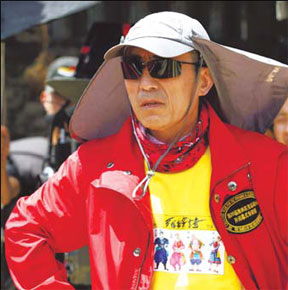Movie
No room for the Golden Broom?
Updated: 2011-02-28 07:45
By Liu Wei (China Daily)
|
Ge You and Shu Qi star in If You are the One 2, directed by Feng Xiaogang. Provided to China Daily |
Nation's version of the Razzies, highlighting the worst of cinema, hopes to keep filmmakers on their toes. But not all are convinced of their credibility. Liu Wei reports.
While a Chinese Academy Awards is yet to materialize, the Razzies are already here. The second Golden Broom Awards, the Chinese version of the Golden Raspberry Awards, or the Razzies, took place in Beijing on Feb 22, to put a spotlight on the worst films of the past year.
Veteran director Feng Xiaogang, whose Aftershock raked in 670 million yuan ($98 million) in 2010, was the biggest "winner". His year-end romantic comedy If You are the One 2 was among the three "most disappointing films of the year" and had "the most disappointing product placement in a film". Feng was also awarded "the most disappointing director of the year".
Not a single winner of the six awards attended the ceremony to accept their trophy - a broom to signify a clean-up.
But Feng responded scathingly in his micro blog that the judges were "shrewd bastards" who should get a "golden abacus award" - implying they were opportunists taking advantage of others' celebrity status.
Actress Hao Lei and director Pang Ho-chueng, who were not nominated, claimed that had they won an award, they would definitely have shown up to accept it.
"The Golden Raspberry waited 15 years for the first winner to pick up his trophy," says film critic Cheng Qingsong, who initiated the awards. "I hope stars of China have more of a sense of humor, because this could be a platform to show their charisma. See what Halle Berry and Sandra Bullock did at the Razzies," he says.
Director Jia Zhangke, Li Shaohong and professor Hao Jian of Beijing Film Academy were among the 20 award presenters.
Cheng started the awards in 2010, when many of his friends, working outside the industry, frequently complained to him about bad films. Zhang Yimou's A Simple Noodle Story won the most awards at the first session, but none of the film makers showed up at that awards ceremony, either.
"To deceive the audience into going to the theaters and make money first is what many filmmakers do now," Cheng says. "The Golden Broom reminds the audience of bad films, and the filmmakers not to make any more of them."
According to Cheng, about 40,000 netizens made their nominations from the films screened in 2010 via four websites, and a 31-person jury of critics, reporters, scholars and filmmakers decided the final winners.
Cheng is not alone. Ding Zhuotao, a director of Hunan TV, created the Sour Mango Awards in 2010, with such categories as "the most fake 3D award", "the most sleep-inducing award" and "the most difficult to understand award". A Simple Noodle Story won the top Sour Mango Film of the Year. Only one winner showed up at the awards ceremony, which was shown on TV.
However, Ding has no grand ambitions of trying to influence the industry.
|
Director Zhang Yimou works on A Simple Noodle Story, which won the top Sour Mango Film of the Year, in 2010. Provided to China Daily |
"I do not think the awards are powerful enough to impact filmmakers," he says. "It works mainly as a platform for people to vent their disappointment when they find a film fails their expectations."
Behind the emergence of these awards is the booming box office, which surged to a record 10 billion yuan ($1.52 billion) in 2010, growing at an average annual rate of 35 percent since 2003. But many films, especially the blockbusters made by prominent directors operating with lavish budgets, received poor reviews but did exceedingly well at the box office.
The Golden Brooms are an attempt to rectify this.
"Most film awards are government controlled while others need to update their award processes. For example, some prizes go to films screened two years before," film critic Tan Fei says.
Meanwhile, online film reviews are mushrooming and in order to stand out, some turn to hyperbole.
"The emergence of a Chinese version of the Razzies is quite understandable. To some extent they just crystallize the online criticism of bad films," Tan adds.
But some say the awards lack credibility. For example, Hunan TV, host of the Sour Mango Awards, produced three widely criticized films in 2009, but only one was nominated and none made the final list. And the 31 judges of the Golden Broom were chosen by Cheng's team, so the awards are likely to be heavily influenced by his own preferences.
"These non-governmental awards could become influential counterparts of mainstream prizes, only if they retain their credibility and independence," Tan says. "Otherwise they will become meaningless hype."
When senior film reporter Liu Jiaqi and her friends started the Iron Elephant Awards in 2007, there were two criteria uppermost in their minds.
It was during that year's Golden Globe that the pair thought, "Why not make our own Golden Globe?" during a casual chat on a bus. Already two sessions of the awards have been held, attended by superstars such as Zhang Ziyi.
From the very beginning Liu has seen the awards as a serious appraisal.
"We work in the industry but keep a distance," she says. "We are not friends with stars or directors, so we can afford to offend them. Iron Elephant is a platform where we can express our true opinions."
More than 100 film journalists vote in the awards, one of which goes to "the most disappointing film of the year".
"Film reporters see many films every year, among which some are worthwhile but people may not know about them because of poor promotion or their less-than-stellar cast. We try to recommend them," she says. "On the other hand, we do not tolerate bad films."
"Many people are likely to think that the non-governmental film awards are just stunts or games," she adds. "The only way to prove we are serious is to keep doing it until we have established a reputation for objectivity and independence."
Specials

'Super moon'
The "Super Moon" arrives at its closest point to the Earth in 2011.

Radiation test
The probability of being exposed to a life-threatening level of radiation is quite slim.

Panic buying of salt
Worried Chinese shoppers stripped stores of salt on radiation fears.

